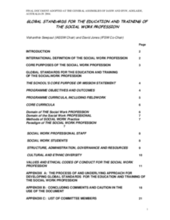The process of developing global standards for the education and training of the social work profession is as important as the product, the actual standards that have been developed. In undertaking such an initiative it was also vital that minority opinions were considered and reflected in the development of the document. This document details nine sets of standards in respect of: the school’s core purpose or mission statement; programme objectives and outcomes; programme curricula including fieldwork; core curricula; professional staff; social work students; structure, administration, governance and resources; cultural diversity; and social work values and ethics. As a point of departure, the international definition of the social work profession is accepted, and the core purposes and functions of social work are summarised.
In July 2001, both the IASSW and the IFSW reached agreement on adopting the following international definition of social work:
"The social work profession promotes social change, problem solving in human relationships and the empowerment and liberation of people to enhance well-being. Utilising theories of human behaviour and social systems, social work intervenes at the points where people interact with their environments. Principles of human rights and social justice are fundamental to social work."
The development of global standards, by their very nature, generally tends to fall within the prescriptive, reductionist, logical-positivist paradigm. Efforts have been made to adopt an alternative and a more empowering, non-prescriptive language in this document. The main aim is to enhance social work education, training and practice on a global level, by facilitating dialogue within and across nations and regions. The document reflects global standards that schools of social work should consistently aspire towards, which (collectively and if met) would actually provide for quite sophisticated levels of social work education and training. This is, as it ought to be – the provision of the best possible education and training for social work students who, after qualifying, bear enormous responsibilities in their communities.
©International Association of the Schools of Social Work (IASSW) and International Federation of Social Workers (IFSW)

